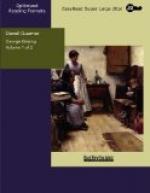At a turn of the road, which, as he well remembered, had been a frequent limit of his nurse-guarded walk five-and-twenty years ago, his eye fell upon a garden gate marked with the white inscription, “Pear-tree Cottage.” It brought him to a pause. This must be Mrs. Wade’s dwelling; the intellectual lady had quite slipped out of his thoughts, and with amusement he stopped to examine the cottage as well as dusk permitted. The front was overgrown with some creeper; the low roof made an irregular line against the sky one window on the ground-floor showed light through a red blind. Mrs. Wade, he had learnt, enjoyed but a small income; the interior was probably very modest. There she sat behind the red blind and meditated on the servitude of her sex. Repressing an inclination to laugh aloud, he stepped briskly forward.
Rickstead consisted of twenty or thirty scattered houses; an ancient, slumberous place, remarkable chiefly for its time-honoured inn, which stood at the crossing of two high roads. The landlord had received notice that two gentlemen would dine under his roof, and the unwonted event was making quite a stir in the hostelry. Quarrier walked in at about a quarter-past six, savoury odours saluted him from the threshold. Glazzard had not yet arrived, but in less than five minutes a private carriage drew up to the door, and the friends hailed each other.
The room prepared for them lay well apart from the bar, with its small traffic. A great fire had been blazing for an hour or two; and the table, not too large, was laid with the best service the house could afford—nothing very grand, to be sure, in these days of its decline, but the general effect was inviting to men with a good appetite and some historical imagination.
“A happy idea of yours!” said Glazzard, as he rubbed his hands before the great hearth. “Are we to begin with a cup of sack?”
Punctually the meal was served; the liquor provided therewith, though of small dignity, did no discredit to the host. They talked and laughed over old Grammar School days, old acquaintances long since dead or lost to sight, boyish ambitions and achievements. Dinner dismissed, a bottle of whisky on the table, a kettle steaming by the fire, Denzil’s pipe and Glazzard’s cigar comfortably glowing, there came a long pause.
“Well, I have a story to fell you,” said Quarrier, at length.
“So I supposed,” murmured the other, without eagerness.
“I don’t know that I should have told it but for that chance encounter at Kew. But I’m not sorry. I think, Glazzard, you are the one man in the world in whom I have perfect confidence.”
The listener just bent his head. His features were impassive.
“It concerns Lilian, of course,” Quarrier pursued, when he had taken a few puffs less composedly than hitherto. “I am telling the story without her leave, but—well, in a way, as I said, the necessity is forced upon me. I can’t help doing many things just now that I should avoid if I had my choice. I have undertaken to fight society by stratagem. For my own part, I would rather deal it a plain blow in the face, and bid it do its worst; but”——He waved his hand.




